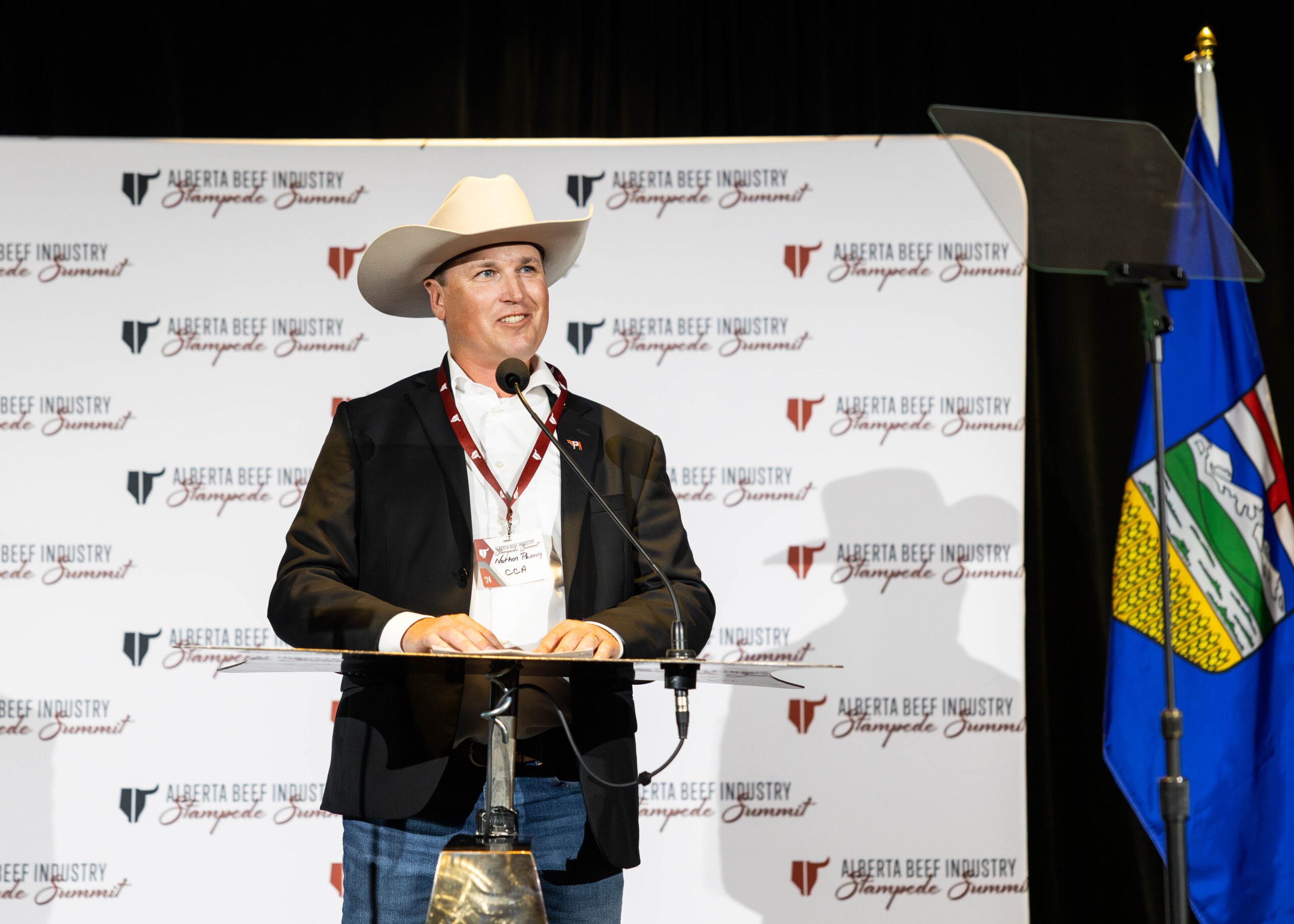AB Direct - Steers
Rail: ---
AB Direct - Heifers
Rail: ---
US Trade- Steers
Rail: ---
US Trade - Heifers
Rail: ---
Canadian Dollar
0.35

Annual Report | Canadian Cattle Association
My annual report for ABP as Canadian Cattle Association (CCA) President helps me look back. And ahead. I have been involved in cattle politics for some time and it helps to lift our head up and see past right now. It’s satisfying to see what is accomplished and what is still to be done is motivating.
The counterweight to the challenges we work on is demand. I’ve been to several countries in this role and people aren’t asking about price – they are asking for more Canadian beef.
This helps me respond to neighbours and others that ask about the price of beef in stores. Our product is amazing, people want it here and everywhere they can get access. That is
reflected in the price. I hope we can continue to see this demand also reflected in live cattle prices. Herd size indicates we should be seeing that for a while yet as the cattle cycle stretches on. There are opportunities and challenges in seeing that become a reality. My replacement will have work to do working with government to open markets, grow the ones we have and to keep the ones we have open. Protectionism always threatens competition. We are that competition in many countries.
Challenges include regulations and other cost increasing measures. We put a lot of CCA’s time into working with the Canadian Food Inspection Agency to update Canada’s Specified Risk Material (SRM) rules now that we are considered a negligible risk country by the World Organization for Animal Health. Our cattle supply is low now, but signals are there for
growth. That growth needs processing. Processing won’t expand in Canada while our SRM rules are so much more costly than the U.S. I am glad the staff we have can wade through
hundreds of pages of risk analysis that will help make these changes. Small or large, new or existing, the competitive imbalance these regulations cause continue to take money out
of the Canadian industry. I hope to see an equivalence with the U.S. soon.
CCA continues to be active in Ottawa. Bill C-282 is a trade bill that would bar future trade negotiations from including supply managed sectors before the negotiations even begin. This is bad and worldwide precedent setting policy. Seeing that bill defeated or otherwise done is a big goal and has been a major focus for CCA this year. Thanks to ABP and many other provincial members and NCFA for leaning in with us. The cattle industry has been staunch and loud. It has been disappointing how few other trade dependent industries have been. I am proud of CCA’s ability to stand strong when needed.
Another private member’s bill getting a lot of press is C-293. As I write this it looks much less likely to get to completion than C-282 due to the Parliamentary cycle. It is another example of a bill that is getting farther than it should in parliament. A section of the bill talks about animal agriculture in a concerning way. The powers it would grant are broad and the detail on how those would be used is lacking without any consultation with key stakeholders. CCA is working with other groups in our opposition to C-293.
We had some good movement with expanding Livestock Price Insurance to the Maritimes. Now we need governments to share in the premiums. As we saw in the U.S. when they
went to shared premiums, there is support for the program, it is just expensive without premium support. Government sharing in premiums like they do with crop insurance would put us on a more level playing field with annual crops and with U.S. cattle producers.
Programs take on a different aspect as we continue to increase our effort in planning and preparing for Foreign Animal Disease. Budget 2023 announced funding for a Foot
and Mouth Disease vaccine bank. That announcement is a win for our advocacy, but only a step. We continue to push to see that announcement realized.
So much goes into dealing with a disease in the herd at the same time as working to regain international market access. Plans that help us speed both of those need to be in place. We
also are working on the plan to ensure there are producers in the industry when we get back to normal markets. That’s a farm program question again but in a different context than year to year production challenges.
Some of that return to markets work involves international standards bodies. It has been good to see the results we have been getting by engaging internationally. United Nations
bodies like the Food and Agriculture Organization have acknowledged the need for animal protein and that improving productivity is better than reducing meat consumption when it
comes to environmental impact. This is a big change from not very long ago. We need to keep engaging in these meetings. There are anti meat and anti trade voices that are very well organized and left alone they will help write the rules to their own goals. These meetings add costs to CCA’s bottom line but the cost of leaving them to the anti crowd is much higher and long term.
Thank you for the support you have given to ABP and CCA over the years. It is that support, both in time and funding that keeps your organization working on all these fronts.
This article was submitted for Alberta Beef Producers’ 2024 Annual Report. Find the full report here.


